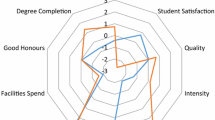Abstract
Evaluations of academic departments through peer review rankings have assumed importance in decision making by government officials, university administrators, and department chairpersons. This article reviews the history of these highly publicized rankings and subsequent attempts to identify empirical correlates of the ratings. New findings are presented which indicate that the ACE rankings can be predicted almost perfectly (r=.91) with one measure—departmental rate of publication in highly cited journals. The implications of this finding are discussed, since it both supports the notion of peer rankings but also reveals some inherent weaknesses in the academic assessment process. Finally, it is suggested that concepts from social stratification theory can illuminate our understanding of evaluation in higher education.
Similar content being viewed by others
References
Astin, A. Undergraduate achievement and institutional ‘excellence.’Science 1968,16 661–668.
Bayer, A. and Folger, J. Some correlates of a citation measure of productivity in science.Sociology of Education 1966,39 381–390.
Beyer, J. and Snipper, R. Objective versus subjective indicators of quality in graduate education.Sociology of Education 1974,47 511–557.
Carter, G. M..Peer review, citations and biomedical research policy: NIH grants to medical school faculty. Santa Monica, CA.: The Rand Corporation, 1974.
Cartter, A.An assessment of quality in graduate education. Washington, D.C.: American Council on Education, 1966.
Cole, J. R., and Cole, S. Scientific output and recognition: a study in the operation of the reward system in science.American Sociological Review 1967,32 377–390.
Cole, J. R., and Cole, S. Measuring the quality of sociological research: problems in the use of the science citation index.American Sociologist 1971,6 23–30.
Cole, J. R., and Cole, S. The Ortega Hypothesis,Science 1972,178 368–375.
Cole, J. R., and Cole, S.Social stratification in science. Chicago: University of Chicago Press, 1974.
Coleman, J., et al.Equality of educational opportunity. Washington, D.C.: U.S. Government Printing Office, 1966.
Crane, D.Invisible colleges: diffusion of knowledge in scientific communities. Chicago: University of Chicago Press, 1972.
Dolan, W.The ranking game: the power of the academic elite. Lincoln, Neb.: Evaluation of Higher Education Committee of the Study Commission on Undergraduate Education and the Education of Teachers, 1976.
Drew, D. E.Science development: an evaluation study. Washington, D.C. National Academy of Sciences, 1975.
Drew, D. E., and Karpf, R. Evaluating science departments: a new index, Santa Monica, CA: The Rand Corporation, 1975.
Elton, C., and Rodgers, S. Physics department ratings: another evaluation.Science 1971,184 565–568.
Hagstrom, W. Inputs, outputs, and the prestige of science departments.Sociology of Education 1971,44 375–397.
Hartnett, R. T., Clark, M. J. and L. L. Baird, Reputational ratings of doctoral programs.Science 1978,199 1310–1314.
Inhaber, H. Is there a pecking order in physics?Physics Today 1974,27 39–43.
Jencks, C., et al.Inequality: a reassessment of the effect of family and schooling in America. New York: Basic Books, 1972.
Kuhn, T.Structure of scientific revolutions. International Encyclopedia of Science, Vol. II, No. 2. Chicago: University of Chicago Press, 1970.
Pirsig, R.Zen and the art of motorcycle maintenance. New York: William Morrow & Co., 1974.
Price, D. J. de S. and Beaver, D. de B. Collaboration in an invisible college.American Psychologist 1966,21 1011–1018.
Robey, J. S. Political science departments: reputations versus productivity.P S: Political Science 1979,12 202–209.
Roose, K. and Andersen, C.A rating of graduate programs. Washington, D.C.: American Council on Education, 1970.
Warner, W. and Lunt, P.The social life of a modern community. New Haven: Yale University Press, 1941.
Williams, R., and Ware, J. An extended visit with Dr. Fox: validity of student ratings after repeated exposure to a lecturer.American Educational Research Journal 1977,14 449–457.
Zoellner, R. Are teaching professors automatically ‘losers’?Chronicle of Higher Education, 1976,40.
Author information
Authors and Affiliations
Rights and permissions
About this article
Cite this article
Drew, D.E., Karpf, R. Ranking academic departments: Empirical findings and a theoretical perspective. Res High Educ 14, 305–320 (1981). https://doi.org/10.1007/BF00976681
Issue Date:
DOI: https://doi.org/10.1007/BF00976681




